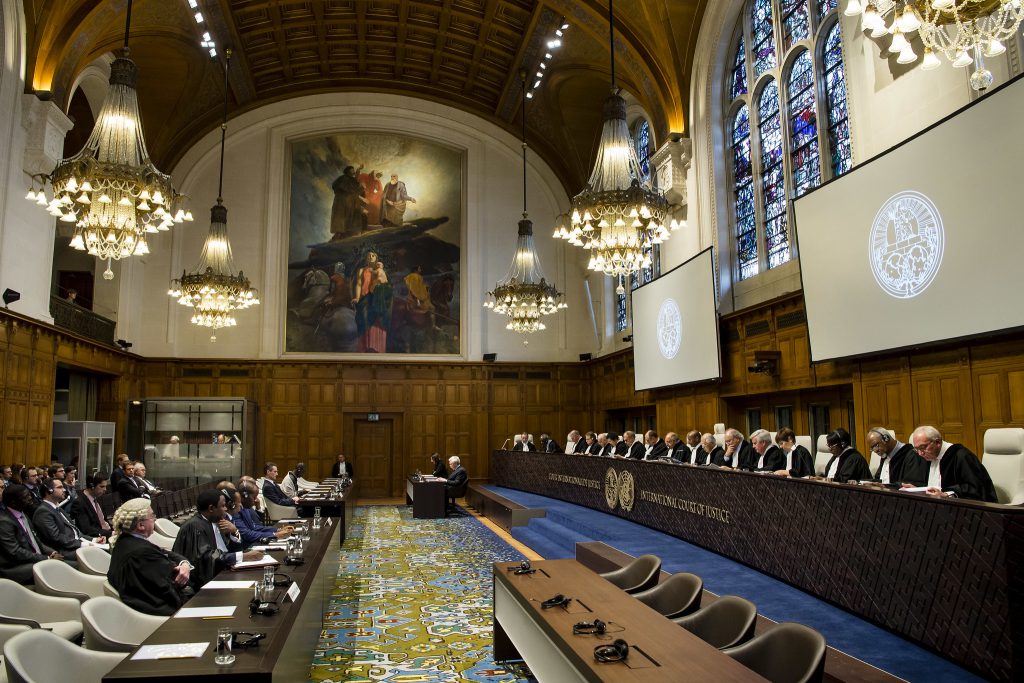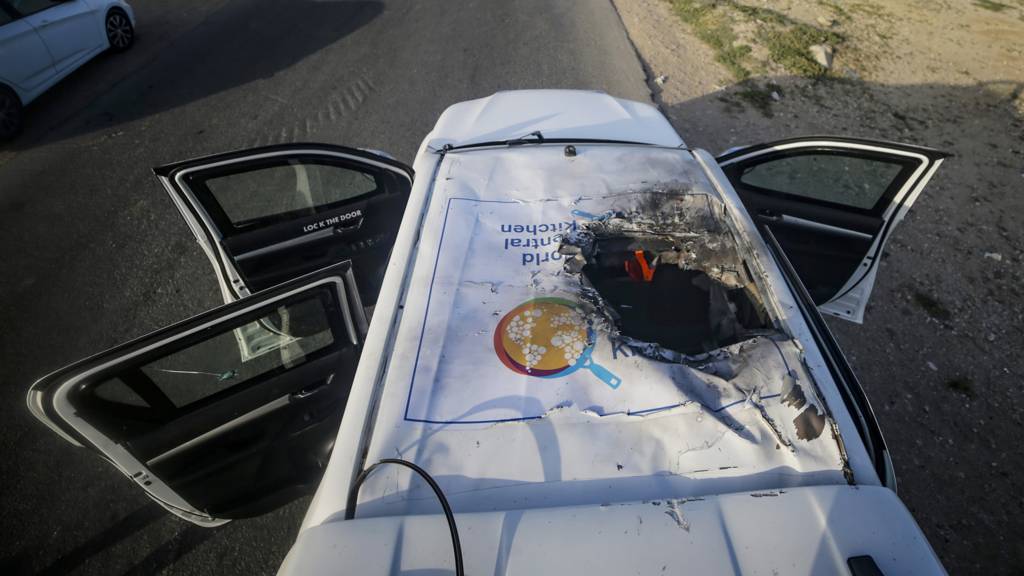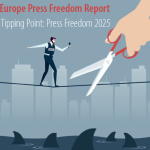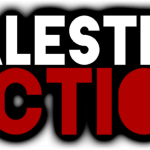The International Court of Justice has unanimously ordered Israel to allow full access to basic food and medical supplies in Gaza to head off famine.
In a legally binding order on March 28, the court told Israel to take “all necessary and effective measures to ensure, without delay, in full cooperation with the United Nations, the unhindered provision at scale by all concerned of urgently needed basic services and humanitarian assistance” including food, water, fuel and medical supplies.
Four days after the ruling, the Israeli military attacked an international aid convoy in Gaza killing seven workers.
Aid agency World Central Kitchen said it had co-ordinated movements with the Israel Defence Force and the aid workers were travelling in two armoured cars emblazoned with the WCK logo and another vehicle.
WCK said the IDF attacked each of the three vehicles separately, one after the other as the aid workers tried to move their companions.
Israeli Prime Minister Benjamin Netanyahu said the Israeli military “unintentionally hit innocent people” in a “tragic incident” and issued a video statement: “This happens in wartime. We are thoroughly looking into it, are in contact with the governments, and will do everything to ensure it does not happen again.”
On the same day as the aid attack, April 1, Iran said a precision Israeli airstrike demolished Iran’s consulate in Syria but not the embassy next door. The airstrike killed two of Iran’s top generals in Syria and five officers.
Israel has claimed it has been allowing aid into Gaza but senior UN, US, other international officials, and NGOs have accused the country of using red tape and bureaucratic measures to restrict and obstruct life-saving aid to Gaza’s population of 2.3 million.
In the wake of the April 1 attack, World Central Kitchen said it was pausing aid in Gaza as did another aid agency, American Near East Refugee Aid, and the United Arab Emirates which finances the maritime aid corridor.
“This is not only an attack against WCK, this is an attack on humanitarian organizations showing up in the most dire of situations where food is being used as a weapon of war,” said Erin Gore, chief executive of World Central Kitchen.

The International Court of Justice order for Israel to allow full access to humanitarian aid in Gaza was requested by South Africa as part of its ongoing case that accuses Israel of state-led genocide in Gaza.
It came three days after a UN Security Council resolution calling for an immediate ceasefire, ongoing diplomatic efforts to find agreement on both a ceasefire and humanitarian aid, and Israeli attacks in the southern Gaza city of Rafah.
The ICJ on 26 January ordered Israel to do all it can to prevent acts of genocide and to take immediate steps to ensure humanitarian assistance in its military offensive in Gaza.
The United Nations’ top court stopped short of ordering a ceasefire and also called for Palestinian armed groups to release hostages captured in the Oct. 7 attacks that precipitated the conflict.
The ICJ ruling by a panel of 17 international judges required Israel to submit a report within a month on what it’s done to comply with 6 provisional measures which include preventing incitement to genocide and destruction of evidence.
South Africa took Israel to court and claimed Israel was committing genocide against the people of Gaza, failing to prevent and punish genocidal talk, and normalising genocidal rhetoric.
Israel – which unusually engaged with the court as it often boycotts international tribunals or UN investigations – rejected the accusations as false and “grossly distorted” and said it was acting to defend itself and fighting Hamas, not the Palestinian population.
The ruling confirmed the court’s view that it has jurisdiction but rejected South Africa’s request to halt military action. It was an interim ruling as it could take years for the court to consider the merits of the genocide accusation.
Provisional measures by the world court are legally binding and cannot be appealed but it has no powers to enforce them.
Immediately after the judgment Israeli Prime Minister Benjamin Netanyahu said that the court had “justly rejected the outrageous demand” to deprive Israel of what he called the “basic right to defend itself”.
“But the mere claim that Israel is committing genocide against Palestinians is not only false, it’s outrageous, and the willingness of the court to even discuss this is a disgrace that will not be erased for generations.”
The Palestinian Foreign Ministry said it was a welcome reminder “no state is above the law” and a senior Hamas official said the decision would contribute to “isolating the occupation and exposing its crimes in Gaza.”
The South African government hailed the court order as a “decisive victory” for international rule of law.
“South Africa sincerely hopes that Israel will not act to frustrate the application of this Order, as it has publicly threatened to do, but that it will instead act to comply with it fully, as it is bound to do.”
The head of the American CIA was reported to be arranging meetings with Israeli, Qatari and Egyptian officials on a potential ceasefire.
The 6 measures approved overwhelmingly by the 17 judges were:
- Israel must … take all measures within its power to prevent the … killing [of Palestinians], causing serious …harm to [them], deliberately inflicting … conditions of life calculated to bring about …physical destruction…, and imposing measures intended to prevent [Palestinian] births.
- Israel shall ensure, with immediate effect, that its military does not commit any acts described above.
- Israel shall take all measures within its power to prevent and punish the direct and public incitement to commit genocide in relation to members of the Palestinian group in the Gaza Strip.
- Israel shall take immediate and effective measures to ensure the provision of urgently needed basic services and humanitarian assistance to address the adverse conditions of life faced by Palestinians in the Gaza Strip.
- Israel shall take effective measures to prevent the destruction and ensure the preservation of evidence related to allegations of acts within the [international convention on genocide]…
- Israel shall submit a report to the court on all measures taken to give effect to this order within one month as from the date of the order.
Israel attacks aid convoy – Reuters
Israel attack reaction and background – BBC
World Central Kitchen
United Arab Emirates pauses aid by sea
ICJ orders Israel to allow humanitarian aid into Gaza – Reuters
ICJ orders Israel to unblock Gaza aid – The Guardian
ICJ orders Israel to take action to address famine in Gaza – Al Jazeera
UN Security Council votes for immediate ceasefire
ICJ interim ruling on genocide – January 26
ICJ orders Israel to prevent genocide in Gaza – AP
ICJ says Israel must stop genocide – Reuters
ICJ orders Israel to prevent genocide – Al Jazeera
ICJ rules Israel must take all measures to avoid genocide – Haaretz
Israeli leaders vow Gaza war to continue – Times of Israel
ICJ orders Israel to prevent genocidal acts – BBC
South Africa and EU call on Israel to abide by the ICJ ruling – The Guardian
ICJ orders Israel to prevent genocide – CBS News
South Africa takes Israel to court for alleged genocide
Israel rejects genocide charges
Israel-Palestine: the legal battle
How will the ICJ rule?
Why the USA cannot ignore the ICJ case – Carnegie Endowment








